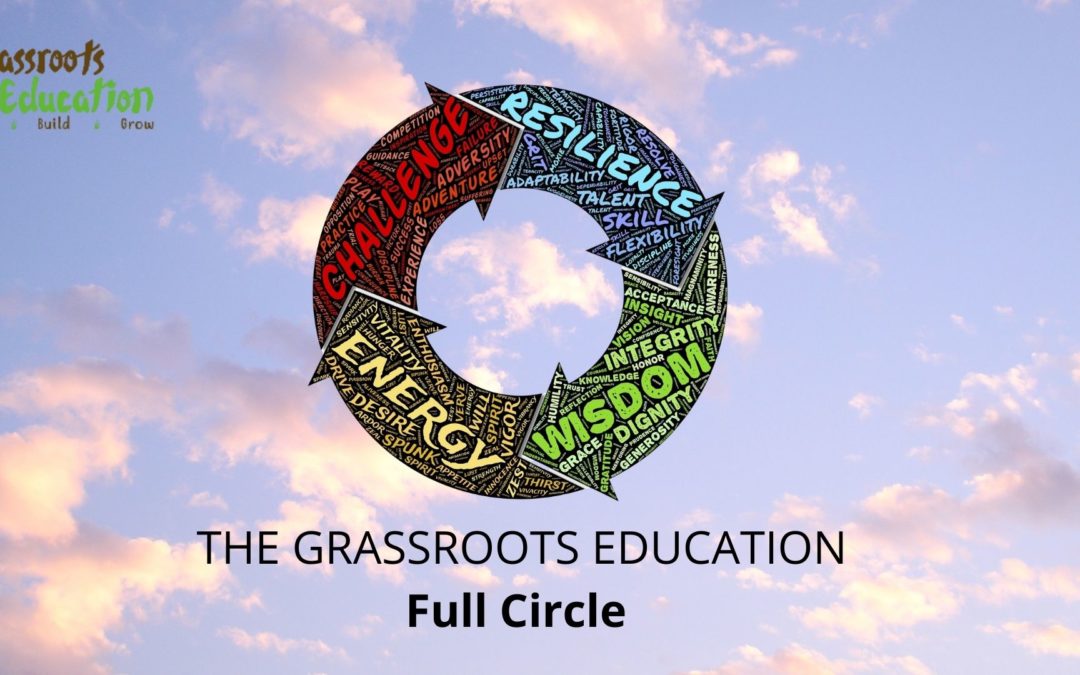
by Marcia Davis-Dawkins | Oct 14, 2020 | Education
Full Circle

Dr. Marcia
Many years ago, I moved to New Jersey to start a new way of life and literally had no joy, but ready to start another phase of my life. One of the things that was an interesting difference that I had to face was that my daughter was attending a Christian private school for Pre-K and K and I felt as if she had a great start and as result was doing great. Added to that she had parents that were very involved in her life and school was no exception. Each class had 10-15 classes which to me was perfect. So, when we arrived in New Jersey and realized that we couldn’t afford for her to attend a private school since it was so expensive, I reluctantly enrolled her in a public school and hoped for the best.
I prepared for the first day of her school and when I got to the school, I saw the line of students and I started have nervous stomach because she was going to be literally a bad situation. I saw too many students and thought the worst! I grew scared and as I walked her to the line my heart was beating faster and faster a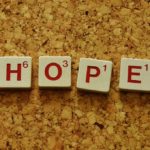 nd nerves were kicking in, “What have I done, how would she survive, I am thinking?” Well, because of her last name she was close to the front of the line, so I watched them walk in the school led by the new young teacher. I watched as they disappeared beyond the doors of the school and I nervously walked to the car to try to work at home. I was still jobless and my relocation was meant to bring new hopes.
nd nerves were kicking in, “What have I done, how would she survive, I am thinking?” Well, because of her last name she was close to the front of the line, so I watched them walk in the school led by the new young teacher. I watched as they disappeared beyond the doors of the school and I nervously walked to the car to try to work at home. I was still jobless and my relocation was meant to bring new hopes.
As I went pick up my daughter from school, I realized the resilience. She walked to me smiling and she was chit chatting feverously. I couldn’t get any words in. She was telling me how excited she was about her new school, new teacher, new people she met and so on. It was obvious that my heart was at rest, this was home and we would have a great time in our new town, new life and new journey.
A few months after that I decided to enter into the classroom which I had abandoned because I thought I would not want to teach outside of my native country, Jamaica. But again, this was not in my hands. I completed the necessary paperwork to be a substitute teacher in the same district that my daughter was now attended. The idea was to see how things were and if I liked it and at least I would have some money until there was better. Well, by this I was doing well, I started to be requested by teachers who realized that I was really a good teacher. The students loved me and so did the teachers and above all most of the administrators I came into contact with. My strength and love of teaching saw a new light and I was ready to go further and watched where I was being led. I began to take all the necessary steps to take look beyond how I can go into the classroom fulltime in this district. So, I dug into getting my transcripts from far and near. I was determined to get in the classroom but it seemed as if I had to pull teeth and literally start all over again. It was heart breaking as I knew that back in Jamaica, I was a certified teacher, but in my new town, state and country, I had to do other things to be certified. It seemed unbearable and overwhelming yet I was determined. It seemed like the norm. I was hearing from so many teachers and principals how well I was doing, and this had gotten my confidence level up. Things were looking and sounding good.
Four years went by and I was given the opportunity by one of the principals, I had done long term sub, short term sub but lacked the full-time status. Imagine the joy when I was called and told, one week before school was scheduled to reopen, that I got a job and would be a third-grade teacher, I was ecstatic! I had one week to get my room together. I literally started living in the classroom so I could get it together. My daughter was there trying to let me feel like I knew how to set up a classroom.
Secretly though I wished I had gotten the job in the same school that my daughter was attending. By this she was in the 5th Grade and I had to adjust myself to dropping her off in the morning and not going back home but heading in another direction in the same town to my newfound job. No matter what, I was excited, I was ready to be that marvelous teacher. And yes, I was delightful to my students. My journey as a teacher was in every grade, for fifteen years, I was a teacher in 2nd, 3rd, 4th, 5th and Basic Skills teacher where I a reading specialist, assisting students to love and master reading. I was a Student Counsel Advisor who planned students’ activities and fundraisers. I was doing well in my eyes, and I was making my mark as an educator.
Then, just before I ended my fifteenth year at this particular school, I was told that I was transferred to another school as a Basic Skills Teacher and then I was psyched out because I was then transferred to another school as a 1st grade teacher and later 3rd and then back to 1st grade. The transfer/change initially was met with much trepidation as I felt wronged and wondered if I wasn’t doing my work in the best of my ability but later came to term with the fact that I can be great wherever I went. The biggest realization was that after 15 years, I was going to be teaching at the school where I wanted to be working at when my daughter was a student there.
Four days into teaching at my new assignment, I sat at my desk, one hour before the start of a new era of teaching first graders virtually. I realized that this is such a significant part of my journey!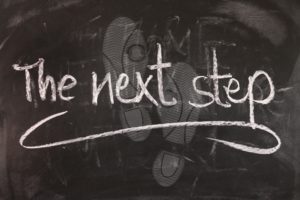
Nineteen years ago, I came into this town and my daughter started 1st grade in this new school and it was 9/11’s anniversary. Terrorists had attacked the United States and I had just moved to the town in NJ which was so near to NY. Thoughts of the morning of the attack flooded me. I remember I had just left my daughter by her school as if it were the first day of this school. I was driving home and was almost home when I heard the broadcaster on the radio say that a plane went into the twin towers in New York, however, the broadcaster sounded as if it were an accident. As I got into the house, I turned on the tv and there was more and more and more. Just pure disbelief of the terroristic act and people were just dying. I realized that I sat speechlessly and wondered if I knew anyone who was in those towers. Interestingly, also I had just gone to New York the Friday before and was to meet a friend and got lost because I took the Path train and had no clue what direction I was to be in. Looking back, it was if I was doing a tour of the area where the Twin Towers were. My steps were orchestrated and I had no clue! It didn’t seem real, the phone line was down, including the cell phone. The news kept going and going which, I then realized there was another attack in Washington D.C. I was clued to the tv, my housework had taken a back seat and I learned through the various news items that 19 militants associated with the Islamic extremist group Al Qaeda hijacked four airplanes and carried out suicide attacks against targets in the United States. Two of the planes were flown into the twin towers of the World Trade Center in New York City, a third plane hit the Pentagon just outside Washington, D.C., and then a fourth plane crashed in a field in Shanksville, Pennsylvania. Overall, I also learned that almost 3,000 people were killed during the 9/11 terrorist attacks, which triggered major U.S. initiatives to combat terrorism and defined the then president, George W. Bush. Travelling by plane changed drastically, securities were tightened everywhere. Here I was facing change, though not as drastic but still change! I was on familiar “grounds” with faculty who knew me from then but others who didn’t, but I was there.
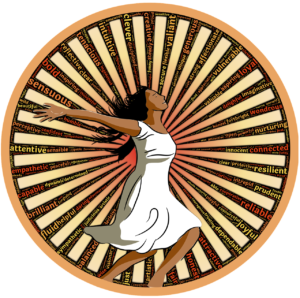 My mind was racing as I thought of the changes I too had gone through and how after 15 years I landed in a position where I wanted to be 15 years ago. The experiences I had, taught me so many things and made me into a stronger person and I realized how much stronger I had become and that I must accept the timing. Could it be that this set of first graders need me and I am just right for them? This new me was ready to embrace the challenges and soar with them. I do know that I must trust the journey especially since I don’t know what it will bring.
My mind was racing as I thought of the changes I too had gone through and how after 15 years I landed in a position where I wanted to be 15 years ago. The experiences I had, taught me so many things and made me into a stronger person and I realized how much stronger I had become and that I must accept the timing. Could it be that this set of first graders need me and I am just right for them? This new me was ready to embrace the challenges and soar with them. I do know that I must trust the journey especially since I don’t know what it will bring.

The circle of life – the new birth of my teaching life!
Education and Success
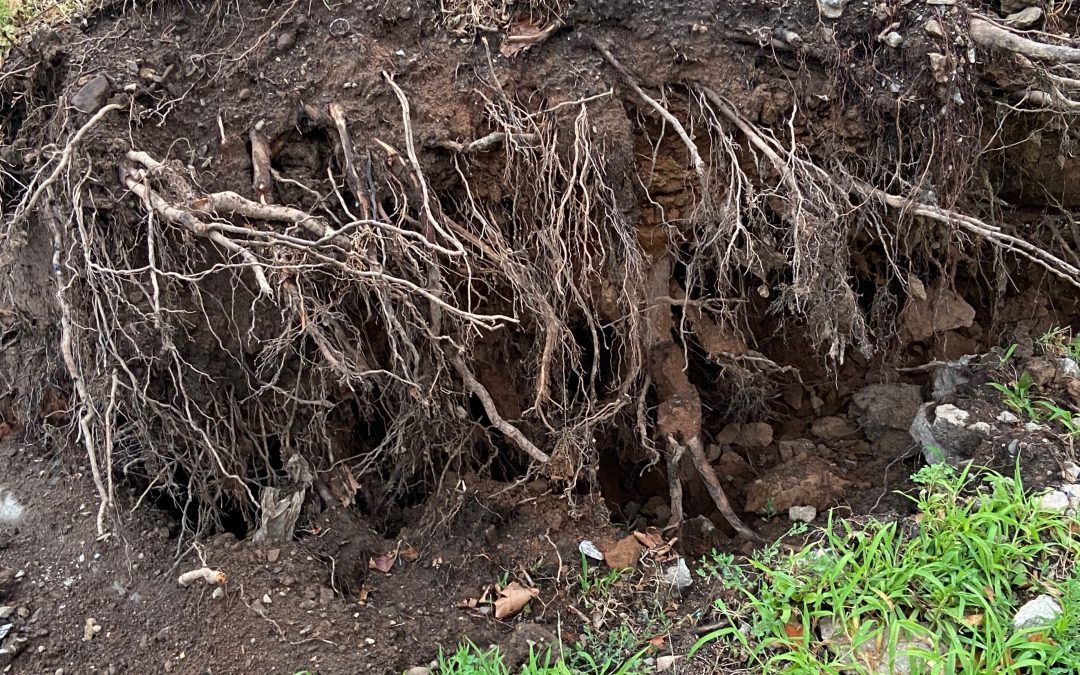
by Marcia Davis-Dawkins | Sep 22, 2020 | Education, Kids, Parents, Teachers
Stay Rooted

By Dr. Marcia
Recently I experienced the remanence of a hurricane and technically a storm. Being from a Caribbean country, Jamaica, I have been through many storms. Storms that were devastating, storms that left the country and the area I was in a state of seemingly disrepair. As I experienced the storms, I thought about the thunder, the lightning, the persistently heavy downpour, the trees being battered, the zincs flying in the air, people’s roofs going everywhere, various objects that are not hunkered down going here and there and even tides and waves rising. I also personalized the storms and how figuratively storms affect my life. Storms of life are everywhere and affect people in different ways, and mine are no exception. Important reminder is that no storm lasts forever and just like in a real hurricane, storms move from side to side but there are definitely here to make us stronger. I somehow think of those days when I see storms and the devastation just seem overwhelming and things just don’t seem to be able to come back together, but with time and efforts from people, things start to be rebuilt and come back together and I even look in awe and wonder how things seems as if nothing happened.
One thing I am certain of is that storms are never friendly, no matter the size or category. They can beat me up and they have made me feel as if I am going under, but then I have to dig deep and stay rooted.
Speaking of staying rooted, as I walked in the park the morning after the recent storm I experienced, it was obvious that some of the trees were uprooted and I thought about how these big, seemingly strong trees were uprooted. Not just the limbs and branches, but most were UPROOTED!! Again, I thought of life for me, the storms of life can uproot me if I am not planted firmly in what I believe and most of all in whom I believe. Will my faith be uprooted by a storm that come my way? Will I be morally sound or rooted? Will the storm knock me off my feet? Will I be prepared?
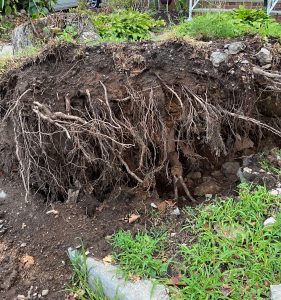 How can I make sure I am prepared for a storm? Well, I do know that part of the preparation for a storm is making sure there is enough food supply, the house is in order – which means making sure that the roofs and buildings are ready to withstand the winds and rain. Preparation means that outdoor furniture is hunkered down so they can’t “fly” away. It also means making sure there is enough water stored just in case the water has to be turned off. There could also be loss of electrical supply, so I have to prepare by getting candles, lanterns, flashlights, lamps, or generators ready, in the event there is a loss of electrical power. Most of all, the weather authorities sometimes warn against going outside during the storm, during the eye of a hurricane, just in case there are flying debris or objects. If I am not prepared, I could be caught off guard and left without even essential items.
How can I make sure I am prepared for a storm? Well, I do know that part of the preparation for a storm is making sure there is enough food supply, the house is in order – which means making sure that the roofs and buildings are ready to withstand the winds and rain. Preparation means that outdoor furniture is hunkered down so they can’t “fly” away. It also means making sure there is enough water stored just in case the water has to be turned off. There could also be loss of electrical supply, so I have to prepare by getting candles, lanterns, flashlights, lamps, or generators ready, in the event there is a loss of electrical power. Most of all, the weather authorities sometimes warn against going outside during the storm, during the eye of a hurricane, just in case there are flying debris or objects. If I am not prepared, I could be caught off guard and left without even essential items.
Just like the physical storms of life, I can be caught off guard in my personal storm of life, and so I must also prepare. It should be noted that the storms will definitely come, and I can ensure that I include the following tips:
- Giving praise or simply giving thanks for the storm, no matter what the magnitude. Believe it or not the storms prepare me for future living and other storms. During the storm I can spend time praying while giving praise.
- I can’t give up, I must persevere. Giving up means I am not giving myself a chance at surviving. I must stay on the target and not expect there to be a quick solution to the problem (storm).
- I must be rooted, grounded and firmly planted. This also means staying focused and not lose hope or faith. Things will and can get better.
- I can draw strength from within or I can draw strength from friends, family or even co-workers because iron can sharpen iron. This also means that we can learn from each other because really and truly, “no man is an island” and we need each other. They can encourage me in some way or other.

After a storm, I realize that some supplies could be limited, (water, food, electrical supplies), but thank God, that he is able to supply ALL my needs no matter what. I must stay rooted in Him so He will continue to lead me to my purpose on this earth. Overall, I must embrace my storms because I wouldn’t get my strength and the storms also gets my attention. Since I am an educator, it also means that I build my life on integrity, and good moral standards so that my students and those whom I encounter will have a positive role model in me.
Peace in the Midst of the Storm
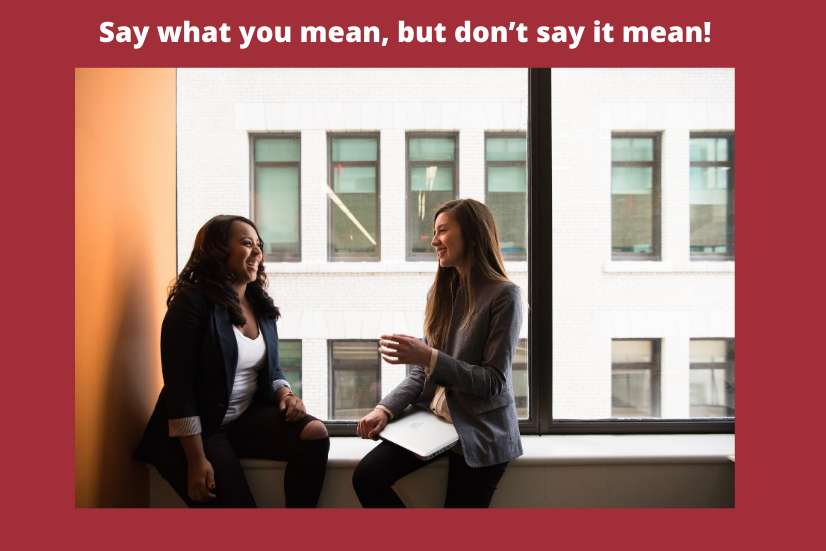
by Marcia Davis-Dawkins | Aug 11, 2020 | Kids, Parents, Teachers
Say What You Mean?
 By Dr. Marcia Davis-Dawkins
By Dr. Marcia Davis-Dawkins
I am almost certain that most of us have heard the expression, “Say what you mean, but don’t say it mean!” How many of us ever think about those words seriously? It is such an interesting statement. Interesting for so many reasons. For instance, if you were to ask a spouse or someone you consider close to you (family or friend) how your outfit looks, and the person doesn’t want to hurt your feelings and you later found out that they lied to you, does that mean that they said what they really meant? Maybe that will mean that you don’t consider that person your friend, simply because you don’t trust that person’s judgement or you don’t believe anything the person says after that. What if the person is brutally honest and tells you the truth and your feelings get hurt, is that person your friend? You already get the feeling that this is a catch 22, whichever way you look at things.
Let’s look at another scenario, where some people will simply say something to upset you just because they don’t like you, so they just want to hurt your feelings. Frankly speaking, I think you can be brutally honest, however, the way you say something can make such a big difference. There is the other side of the coin where before you speak, you can let the words pass through a few gates. Is your statement the truth? Is your statement necessary? or Is the statement kind? I suppose if everyone in the world were considerate and kind, I wouldn’t even be writing about this issue! Then again, the world might be too easy to live in, if everyone were loving and kind!
As I am writing this, I can’t help but reflect on when I decided I wanted to become an educator. Part of my reasoning was that I wanted to be kind and loving because so few of my teachers had those character traits. Most importantly, I wanted to be different and yes, change the world. Little did I know that I was in for a rude awakening because no matter how kind I was, I seemed to meet those people all around, who were just plain and simply mean. At times there seemed to be no empathy and leader/mentorship. Whatever happened to one of the golden rule, “treat others the way you wanted to be treated”? Because I know I don’t like the feeling of being treated badly, I am usually cognizant of how I treated others. For instance, I know that I don’t like to be teased, so I don’t tease people – not even if it is considered a joke. What is considered a joke to some is hurtful and harmful to others. Educators in general, and especially leaders should be able to have the attributes of empathy, caring, kindness and listening as part of the toolkits in educating our young minds and even in collaborating with fellow educators. These qualities, as researches have shown, are necessary and important skills needed for 21st century leadership. How we communicate with each other is key if we expect to see growth in our lives and our communities overall. Without a doubt it will also encourage productivity or effectiveness when we are able to express empathy, which will in turn increase inclusiveness.
I remember years ago, hearing a parent saying to their child, Tammy*, that they should not play with their friend, Becca*, because she wasn’t good friend. The parent even went on to say that Tammy would “not be ambitious if she played with Tammy.” Let’s understand that these children were both nine-years-old, and that I later learned that the parent simply thought that the Becca was in a lower economic group and should not be around Tammy. What kind of message is that sending to the children? Of course, the parent said what she meant, but it was definitely with ill intent. One thing, I do know is that love can be liberating and how can children be liberated if children not being taught how to love? It is no wonder our world is so filled with hate. We teach our children how to hate and the cycle goes on and on.
If parents were to reach out and send positive lessons to their children, they would learn how to love and accept everyone for who they are and build each other up instead of tearing them down.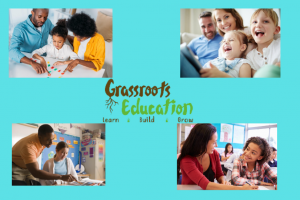
It is always my intention to mean what I say and try to choose my words carefully, so I don’t hurt others. For those who have a similar mindset, we should avoid people whose aim is to be unkind and excuse their words as a joke! Instead of being labeled as “oversensitive”, our peers and colleagues should take into consideration the power of their words. Try not to focus on people who have no regard for our thoughts and feelings and surround ourselves with people who talk less and listen more.
Parental Involvement and Students’ Success
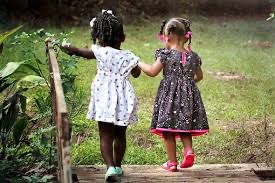
by Marcia Davis-Dawkins | Jul 6, 2020 | Education
There Should Be Balance!

By Dr. Marcia Davis-Dawkins
Mother’s Day 2020 was not a normal one. It seems like it would be just another COVID-19 day, one that we were quarantined and would sit and be grateful for being alive and well unlike so many others who had succumbed to the dreaded pandemic. After all, Mother’s Day will be special for me whichever way I took it.
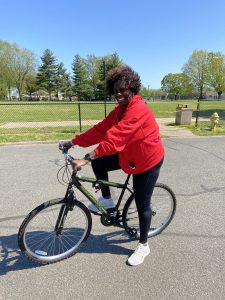 My daughter decided that she would surprise me and teach me to ride a bicycle! This sounded crazy especially since most people at my age can ride a bicycle, so the comments I usually get include, “How come you can’t ride a bicycle?” “You really can’t ride a bike?” “Were you just a scaredy-cat?” Little did they know that not everyone is privileged to have access to a bicycle, and that was not priority when I was younger. Anyway, as I was learning I realized that there had to balance and that was the key to my being successful. I needed to face my fear of falling and learn how to balance on the bicycle! Albert Einstein’s words rang in my ears as I tried the arduous task of balancing. He said that “Life is like riding a bicycle. To keep your balance, you must keep moving.” I have taken cycling classes before at the gym and in fact, seen this quote on the wall of the cycling class but it didn’t matter then since the bikes were stationary and all I had to do was pedal to get going and the more I pedaled the faster I would go which would mean that I burnt more calories. This I had to put in place the hard way and truth be told, I learned the hard way because I tried to do things my way and let fear get in the way. Now I have a scar on my shin to show that I need balance in my life!
My daughter decided that she would surprise me and teach me to ride a bicycle! This sounded crazy especially since most people at my age can ride a bicycle, so the comments I usually get include, “How come you can’t ride a bicycle?” “You really can’t ride a bike?” “Were you just a scaredy-cat?” Little did they know that not everyone is privileged to have access to a bicycle, and that was not priority when I was younger. Anyway, as I was learning I realized that there had to balance and that was the key to my being successful. I needed to face my fear of falling and learn how to balance on the bicycle! Albert Einstein’s words rang in my ears as I tried the arduous task of balancing. He said that “Life is like riding a bicycle. To keep your balance, you must keep moving.” I have taken cycling classes before at the gym and in fact, seen this quote on the wall of the cycling class but it didn’t matter then since the bikes were stationary and all I had to do was pedal to get going and the more I pedaled the faster I would go which would mean that I burnt more calories. This I had to put in place the hard way and truth be told, I learned the hard way because I tried to do things my way and let fear get in the way. Now I have a scar on my shin to show that I need balance in my life!
How many of us can remember being on a seesaw as a younger you? Well, I can especially since being on a seesaw was not much of challenge, so I mastered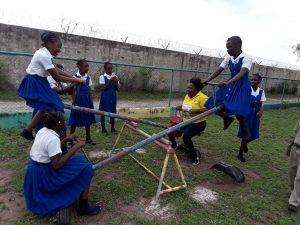 the art of see-sawing! Well, think about it if there is balance with the see-saw then both sides are on the same level. For those of you who are unsure what a seesaw is it a common playground equipment that features a board balanced in the center. One person sits on each end, and they take turns pushing their feet against the ground to lift their side into the air.
the art of see-sawing! Well, think about it if there is balance with the see-saw then both sides are on the same level. For those of you who are unsure what a seesaw is it a common playground equipment that features a board balanced in the center. One person sits on each end, and they take turns pushing their feet against the ground to lift their side into the air.
Taking care of ourselves includes having a balance so that we are not indulging in too much of anything. It means that we are listening to our bodies and ensuring that everything is aligned and feels good or okay. Many of us can tell for instance, when we have eaten too much and feeling stuffed. If we eat too much, then we will feel stuffed as well as gain too much weight. Then there is a spiral effect, if you gain too much weight then, there could be health issues like diabetes, or heart problems which then means that we don’t feel good about ourselves.
Setting boundaries is part of making things balance. If we are not balanced emotionally, then we are always down on ourselves. For instance, we might spend too much time watching the news, which tend to be sad and disturbing so watching the news can cause us to be depressed and unbalanced emotionally. We should therefore set emotional boundaries, so we don’t become too upset or even angry. We should be emotionally okay so much so that if we feel as if we need to talk to a therapist, then we should and avoid the misnomer that people will assume we are unstable if they are aware that we are seeing a therapist.
Balancing can also mean management of people we listen to or the types of people we surround ourselves with. Most times if we are surrounded by negatives people in our space then we tend to think just like they do which can become draining. Get rid of toxic people, who thrive on getting us down. Take time to breathe and feel save. Talk to friends and family who make you happy and confident. Sometimes our space has too much unnecessary noise and we find that people are saying things without even aware of facts versus false news. We should consider fact or just simply knowing the truth. Sometimes if we are uninformed, we can read to get informed and read from reliable sources so we can get in the know. Again, know when we are reading too much – stay balanced and know when to take a break and even say the right thing to others. Everyone’s mental health is not the same so we should balance and choose our words wisely.
 Another important part of the balancing act in life is learning exercise often, so that we will stay healthy and even feel good about ourselves. This also ties in well with eating healthily so that we can no doubt feel happy because we won’t develop chronic diseases. Overall, we take care of self emotionally, spiritually, and physically. But in everything, don’t overdue things, don’t overeat, don’t over exercise, don’t over talk, and so on. As educators, we tend to take care of others, before we take care of ourselves. We must ensure that we are sending the correct messages to our children and believe it or not they will know when we are not taking care of ourselves. Help our students celebrate wins, especially when a skill is learned. Sometimes we extend ourselves too far, too much time for family and none for self – set balances. If there are no balances, then we eventually get burnt out. Be and feel valuable, affirm ourselves and feel confident! After all, our bodies should be our temples.
Another important part of the balancing act in life is learning exercise often, so that we will stay healthy and even feel good about ourselves. This also ties in well with eating healthily so that we can no doubt feel happy because we won’t develop chronic diseases. Overall, we take care of self emotionally, spiritually, and physically. But in everything, don’t overdue things, don’t overeat, don’t over exercise, don’t over talk, and so on. As educators, we tend to take care of others, before we take care of ourselves. We must ensure that we are sending the correct messages to our children and believe it or not they will know when we are not taking care of ourselves. Help our students celebrate wins, especially when a skill is learned. Sometimes we extend ourselves too far, too much time for family and none for self – set balances. If there are no balances, then we eventually get burnt out. Be and feel valuable, affirm ourselves and feel confident! After all, our bodies should be our temples.
HOME
Determination and Perseverance

by Marcia Davis-Dawkins | Jun 2, 2020 | Education
Invisible Child
 By Dr. Marcia Davis-Dawkins
By Dr. Marcia Davis-Dawkins
Recently I was asked by one of my friends, why I didn’t play a sport. Well, I calmly responded, “I didn’t get the opportunity to do so.” In my heart, I thought it would have ended there but it didn’t. He gasped and said, “Don’t tell me non-sense, in Jamaica, that is a poor excuse! There are so many sports in Jamaica and so many opportunities.” Needless to say, I was upset, but the conversation didn’t end so I gave him a brief version of the story. I was not convinced that he was satisfied with my reasoning but ah, well.
Long after our conversation, I was still a bit perturbed because I thought of how many times people including me, assumed that others have “so many opportunities”. The assumption is that we can be better with the presumed opportunities. Some educators assume that students cannot learn and they or their parents are not interested in learning. In the early stages of remote learning, it was evident that there were some teachers and parents who had resources to learn and assumed that every student had the same opportunities. There were students who didn’t have laptops or internet, for that matter, and those same students were not able to continue learning because of lack of resources. We must remember that not all students have the same opportunity. 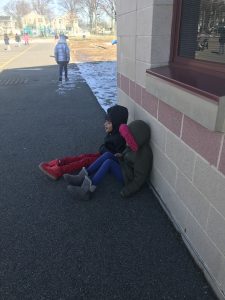
As I reflect equal opportunity for students, I can’t help but to be reminded of Maslow’s Hierarchy of Needs. This concept emphasizes the basic human needs: food, water, clothing, and shelter. Many families from low income neighbors are determined meet the needs of their families for survival, but schools may not be sensitive to the fact that many laptops and electronics are considered luxury items.
These students, who are overlooked and forgotten, I would consider an Invisible Student. Like myself when I was younger, the Invisible Student is the last to be considered. Their circumstances feel uncommon to a typical middle-class experience and many decisions made by educators are not in their favor. We as educators make decisions that affect the students negatively because we are making assumptions. For instance, a typical assumption is that they are troublemakers who can’t or refuse to learn. We make assumptions that some students or even colleagues are of less value than others and therefore, we treat them differently. It saddens me that we say ALL students are equal and yet we don’t treat them as such. Are we just saying things and not acting on the words?
We must realize that when students or people in general are hurting, they will yell. When the yells are not hurt, they start screaming. After the screams are not heard, they will act out because they feel frustrated. It was Dr. Martin Luther King Jr., who once said, “A riot is the voice of the unheard.” Obviously, students will yell because they feel they are not being heard. The Invisible Students want to be seen and heard. Do we take time to listen to them?
Most times, they do have underlined issues why they act out. We are failing them by not taking the time to listen to them.
Sometimes it seems as if we as educators are not compassionate, we tend to scream at our students too, and expect them to feel special and work to their full potential. Students are individuals who deserve respect. Unless we acknowledge our students’ hurt and realize that they have a purpose, we probably won’t make a marked difference in their lives. Are we playing the role of educators and helping the students reach their goals? We might not be validating our students’ emotions or make them feel as if they have a voice. Dare I say, we might be stepping on their progress because we disregard that they are visible? At times we are simply passive observers and take out our frustrations on the students. Life for us can be so unfair and painful, that we too label students and colleagues negatively and have the nerve to say they are ANGRY, without knowing their stories – we prejudge them!
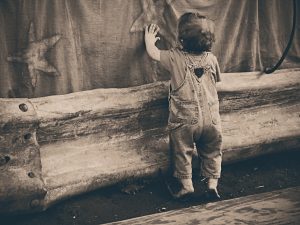 It is a fact that if we treat people less than they are worth, then eventually we will be treated badly as well – karma as it is known. Let us make an effort to see others as equal or even special. Help to motivate and encourage our students to feel better about themselves. Let us examine ourselves and see if we are stifling our students or colleagues. Like Maya Angelou once said, “I’ve learned that people will forget what you said, people will forget what you did, but people will never forget how you made them feel.” Help students feel visible! Let’s make a difference as educators and I feel hopeful that we can send positive energies in our students’ spaces since we are who we think! We can release hopelessness and/or anger in our students. As the “Starfish” story states, at the end, “no we can’t save every Starfish” but “It makes a difference” to those who you do reach and help and send on to greater heights. Encourage equity among your colleagues and students. Try to make a difference to ALL students, even the invisible ones.
It is a fact that if we treat people less than they are worth, then eventually we will be treated badly as well – karma as it is known. Let us make an effort to see others as equal or even special. Help to motivate and encourage our students to feel better about themselves. Let us examine ourselves and see if we are stifling our students or colleagues. Like Maya Angelou once said, “I’ve learned that people will forget what you said, people will forget what you did, but people will never forget how you made them feel.” Help students feel visible! Let’s make a difference as educators and I feel hopeful that we can send positive energies in our students’ spaces since we are who we think! We can release hopelessness and/or anger in our students. As the “Starfish” story states, at the end, “no we can’t save every Starfish” but “It makes a difference” to those who you do reach and help and send on to greater heights. Encourage equity among your colleagues and students. Try to make a difference to ALL students, even the invisible ones.
https://youtu.be/bck-Pm-VDpk The Starfish Story I invite you to watch this video and be inspired
Back To Home


 nd nerves were kicking in, “What have I done, how would she survive, I am thinking?” Well, because of her last name she was close to the front of the line, so I watched them walk in the school led by the new young teacher. I watched as they disappeared beyond the doors of the school and I nervously walked to the car to try to work at home. I was still jobless and my relocation was meant to bring new hopes.
nd nerves were kicking in, “What have I done, how would she survive, I am thinking?” Well, because of her last name she was close to the front of the line, so I watched them walk in the school led by the new young teacher. I watched as they disappeared beyond the doors of the school and I nervously walked to the car to try to work at home. I was still jobless and my relocation was meant to bring new hopes.
 My mind was racing as I thought of the changes I too had gone through and how after 15 years I landed in a position where I wanted to be 15 years ago. The experiences I had, taught me so many things and made me into a stronger person and I realized how much stronger I had become and that I must accept the timing. Could it be that this set of first graders need me and I am just right for them? This new me was ready to embrace the challenges and soar with them. I do know that I must trust the journey especially since I don’t know what it will bring.
My mind was racing as I thought of the changes I too had gone through and how after 15 years I landed in a position where I wanted to be 15 years ago. The experiences I had, taught me so many things and made me into a stronger person and I realized how much stronger I had become and that I must accept the timing. Could it be that this set of first graders need me and I am just right for them? This new me was ready to embrace the challenges and soar with them. I do know that I must trust the journey especially since I don’t know what it will bring.
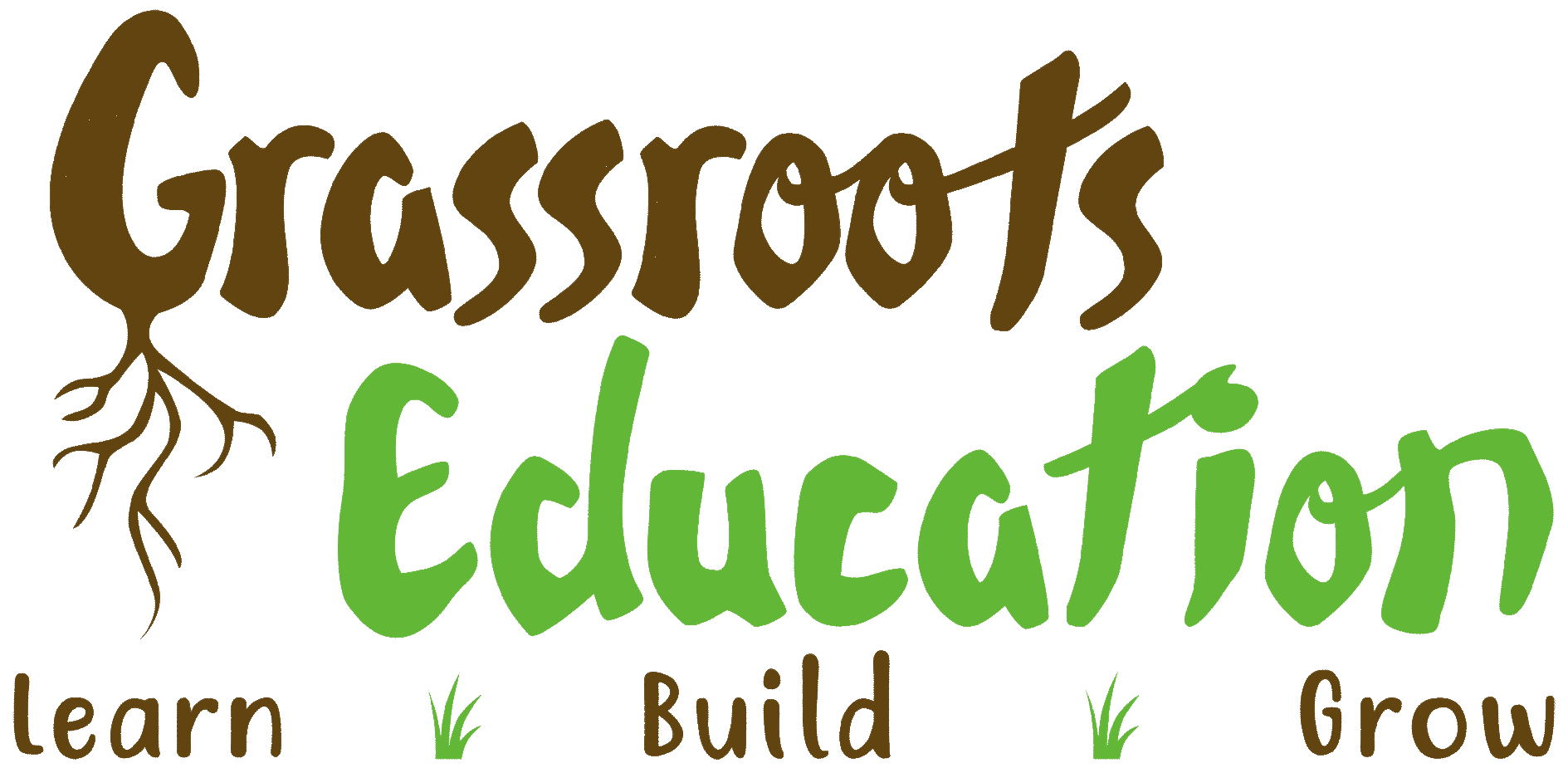


 How can I make sure I am prepared for a storm? Well, I do know that part of the preparation for a storm is making sure there is enough food supply, the house is in order – which means making sure that the roofs and buildings are ready to withstand the winds and rain. Preparation means that outdoor furniture is hunkered down so they can’t “fly” away. It also means making sure there is enough water stored just in case the water has to be turned off. There could also be loss of electrical supply, so I have to prepare by getting candles, lanterns, flashlights, lamps, or generators ready, in the event there is a loss of electrical power. Most of all, the weather authorities sometimes warn against going outside during the storm, during the eye of a hurricane, just in case there are flying debris or objects. If I am not prepared, I could be caught off guard and left without even essential items.
How can I make sure I am prepared for a storm? Well, I do know that part of the preparation for a storm is making sure there is enough food supply, the house is in order – which means making sure that the roofs and buildings are ready to withstand the winds and rain. Preparation means that outdoor furniture is hunkered down so they can’t “fly” away. It also means making sure there is enough water stored just in case the water has to be turned off. There could also be loss of electrical supply, so I have to prepare by getting candles, lanterns, flashlights, lamps, or generators ready, in the event there is a loss of electrical power. Most of all, the weather authorities sometimes warn against going outside during the storm, during the eye of a hurricane, just in case there are flying debris or objects. If I am not prepared, I could be caught off guard and left without even essential items.




 My daughter decided that she would surprise me and teach me to ride a bicycle! This sounded crazy especially since most people at my age can ride a bicycle, so the comments I usually get include, “How come you can’t ride a bicycle?” “You really can’t ride a bike?” “Were you just a scaredy-cat?” Little did they know that not everyone is privileged to have access to a bicycle, and that was not priority when I was younger. Anyway, as I was learning I realized that there had to balance and that was the key to my being successful. I needed to face my fear of falling and learn how to balance on the bicycle! Albert Einstein’s words rang in my ears as I tried the arduous task of balancing. He said that “Life is like riding a bicycle. To keep your balance, you must keep moving.” I have taken cycling classes before at the gym and in fact, seen this quote on the wall of the cycling class but it didn’t matter then since the bikes were stationary and all I had to do was pedal to get going and the more I pedaled the faster I would go which would mean that I burnt more calories. This I had to put in place the hard way and truth be told, I learned the hard way because I tried to do things my way and let fear get in the way. Now I have a scar on my shin to show that I need balance in my life!
My daughter decided that she would surprise me and teach me to ride a bicycle! This sounded crazy especially since most people at my age can ride a bicycle, so the comments I usually get include, “How come you can’t ride a bicycle?” “You really can’t ride a bike?” “Were you just a scaredy-cat?” Little did they know that not everyone is privileged to have access to a bicycle, and that was not priority when I was younger. Anyway, as I was learning I realized that there had to balance and that was the key to my being successful. I needed to face my fear of falling and learn how to balance on the bicycle! Albert Einstein’s words rang in my ears as I tried the arduous task of balancing. He said that “Life is like riding a bicycle. To keep your balance, you must keep moving.” I have taken cycling classes before at the gym and in fact, seen this quote on the wall of the cycling class but it didn’t matter then since the bikes were stationary and all I had to do was pedal to get going and the more I pedaled the faster I would go which would mean that I burnt more calories. This I had to put in place the hard way and truth be told, I learned the hard way because I tried to do things my way and let fear get in the way. Now I have a scar on my shin to show that I need balance in my life! the art of see-sawing! Well, think about it if there is balance with the see-saw then both sides are on the same level. For those of you who are unsure what a seesaw is it a common playground equipment that features a board balanced in the center. One person sits on each end, and they take turns pushing their feet against the ground to lift their side into the air.
the art of see-sawing! Well, think about it if there is balance with the see-saw then both sides are on the same level. For those of you who are unsure what a seesaw is it a common playground equipment that features a board balanced in the center. One person sits on each end, and they take turns pushing their feet against the ground to lift their side into the air. Another important part of the balancing act in life is learning exercise often, so that we will stay healthy and even feel good about ourselves. This also ties in well with eating healthily so that we can no doubt feel happy because we won’t develop chronic diseases. Overall, we take care of self emotionally, spiritually, and physically. But in everything, don’t overdue things, don’t overeat, don’t over exercise, don’t over talk, and so on. As educators, we tend to take care of others, before we take care of ourselves. We must ensure that we are sending the correct messages to our children and believe it or not they will know when we are not taking care of ourselves. Help our students celebrate wins, especially when a skill is learned. Sometimes we extend ourselves too far, too much time for family and none for self – set balances. If there are no balances, then we eventually get burnt out. Be and feel valuable, affirm ourselves and feel confident! After all, our bodies should be our temples.
Another important part of the balancing act in life is learning exercise often, so that we will stay healthy and even feel good about ourselves. This also ties in well with eating healthily so that we can no doubt feel happy because we won’t develop chronic diseases. Overall, we take care of self emotionally, spiritually, and physically. But in everything, don’t overdue things, don’t overeat, don’t over exercise, don’t over talk, and so on. As educators, we tend to take care of others, before we take care of ourselves. We must ensure that we are sending the correct messages to our children and believe it or not they will know when we are not taking care of ourselves. Help our students celebrate wins, especially when a skill is learned. Sometimes we extend ourselves too far, too much time for family and none for self – set balances. If there are no balances, then we eventually get burnt out. Be and feel valuable, affirm ourselves and feel confident! After all, our bodies should be our temples.
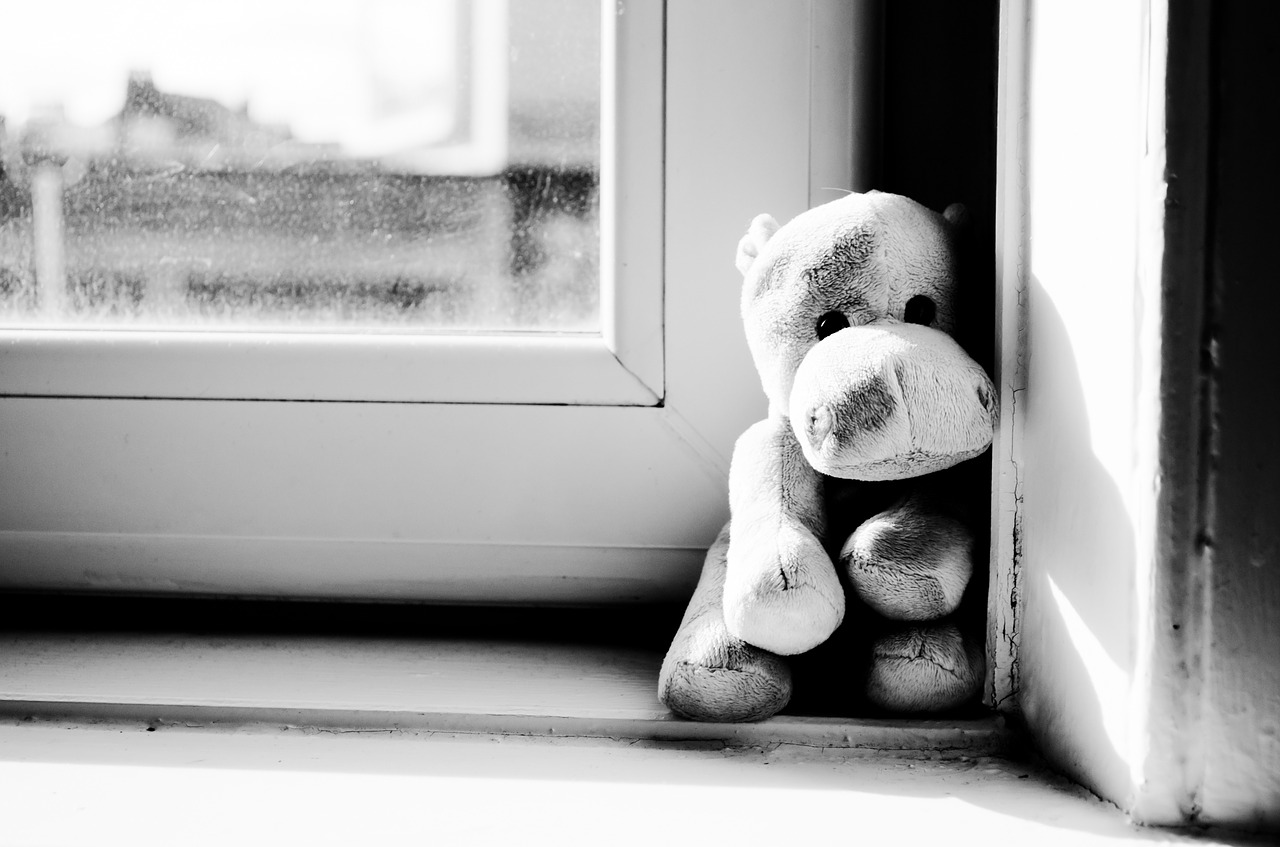
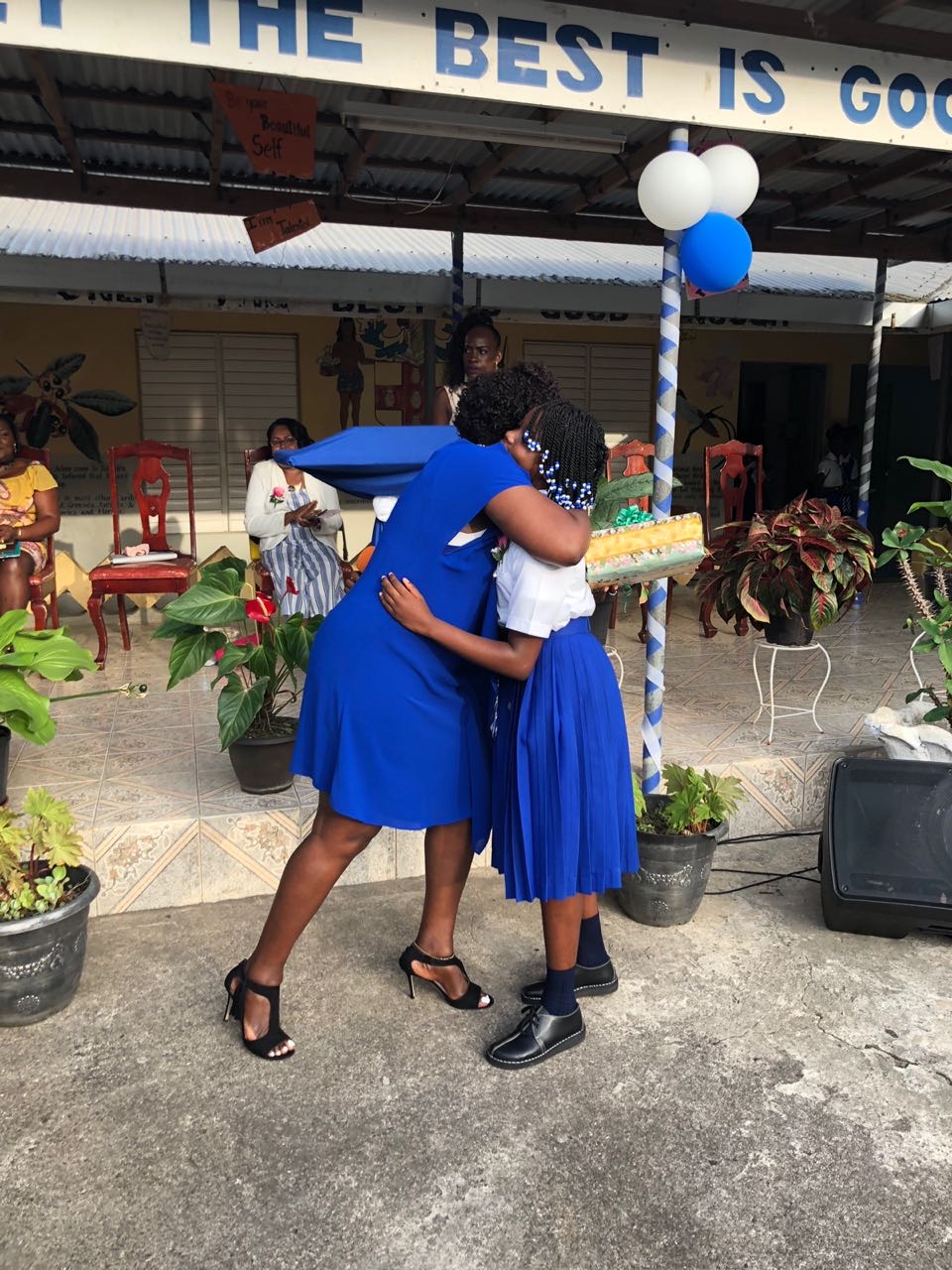
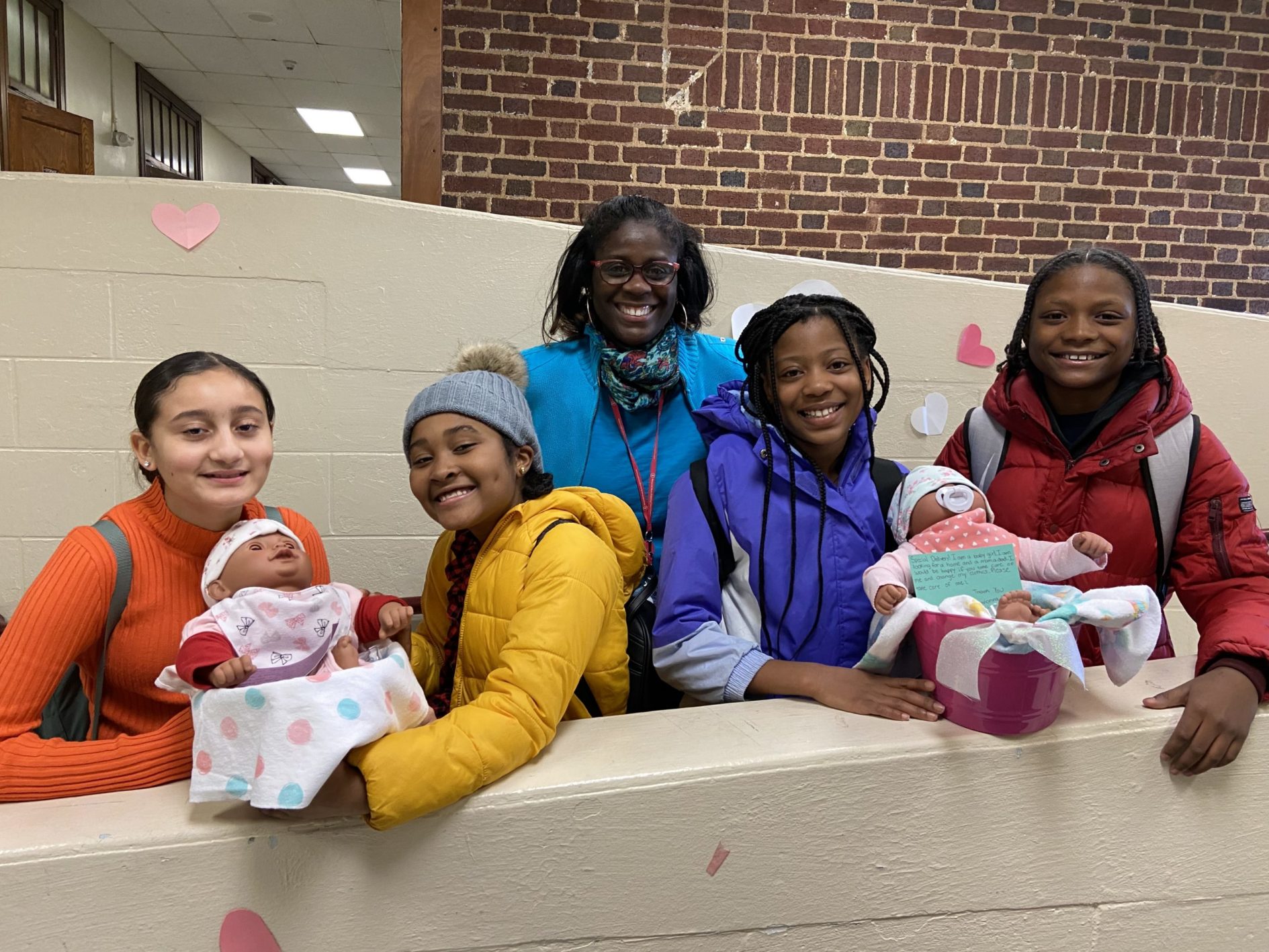

 It is a fact that if we treat people less than they are worth, then eventually we will be treated badly as well – karma as it is known. Let us make an effort to see others as equal or even special. Help to motivate and encourage our students to feel better about themselves. Let us examine ourselves and see if we are stifling our students or colleagues. Like Maya Angelou once said, “I’ve learned that people will forget what you said, people will forget what you did, but people will never forget how you made them feel.” Help students feel visible! Let’s make a difference as educators and I feel hopeful that we can send positive energies in our students’ spaces since we are who we think! We can release hopelessness and/or anger in our students. As the “Starfish” story states, at the end, “no we can’t save every Starfish” but “It makes a difference” to those who you do reach and help and send on to greater heights. Encourage equity among your colleagues and students. Try to make a difference to ALL students, even the invisible ones.
It is a fact that if we treat people less than they are worth, then eventually we will be treated badly as well – karma as it is known. Let us make an effort to see others as equal or even special. Help to motivate and encourage our students to feel better about themselves. Let us examine ourselves and see if we are stifling our students or colleagues. Like Maya Angelou once said, “I’ve learned that people will forget what you said, people will forget what you did, but people will never forget how you made them feel.” Help students feel visible! Let’s make a difference as educators and I feel hopeful that we can send positive energies in our students’ spaces since we are who we think! We can release hopelessness and/or anger in our students. As the “Starfish” story states, at the end, “no we can’t save every Starfish” but “It makes a difference” to those who you do reach and help and send on to greater heights. Encourage equity among your colleagues and students. Try to make a difference to ALL students, even the invisible ones.